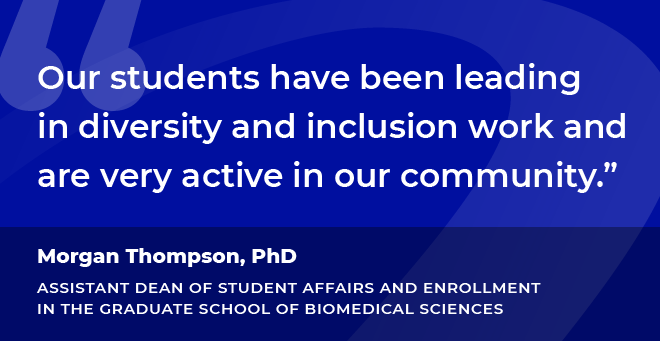 |
Project Civility, a new series of programs that takes a deep dive into diversity and inclusion issues not covered across UMass Medical School’s curricula, kicked off this month with an online conversation about understanding privilege. It was the first of six sessions planned throughout the academic year.
Other upcoming Project Civility workshops will focus on microaggressions and bias (Oct. 21); bystander interventions (Dec. 3); and leadership development, community building, mindfulness and more, planned for winter-spring 2021.
Approximately 25 students, educators and staff participated in the first evening Zoom session. More than 100 have signed up for upcoming programs. Presentations were followed by small group break-out sessions that stimulated personal reflection on individual identity, coping with success, and struggles and meanings of privilege.
“There are many things you can’t tell just by looking at people,” said Mark Miceli, EdD, assistant vice provost for student life, director of student affairs in the School of Medicine and a Project Civility committee member, after an introductory exercise among participants.
Miceli said the program’s goals are to provide in-depth opportunities to explore diversity, build personal skills and “to enhance the learning outcomes and help to foster community and connections among schools” by including students from all three UMMS schools.
Project Civility grew out of a common orientation session across the schools last summer, called “the identity molecule,” an activity that helps people understand their own identity and provides perspective into others’ so they can have a foundation upon which to build other diversity and inclusion work.
But its roots may go back a few years ago to School of Medicine students who were looking for more diversity programming and formed a planning committee for activities targeted for orientation week, according to Justine Cameron, MPP, a Project Civility committee member and project coordinator for student affairs in the School of Medicine.
“The seeds of our work almost always come from student voices and student leadership,” Cameron said. “It’s actually all the feedback that we’ve received and from working with students that informs the topics. They’re also topics that we each have experience or training in and can provide for our community.”
“We had rave reviews. We never really offered anything like ‘the identity molecule’ in orientation before,” said Max Quinn, MEd, assistant dean of student affairs and enrollment management for the Graduate School of Nursing.
Quinn said he and student affairs colleagues across UMMS said, “Let’s put our brains together and provide an unprecedented programming slate for our students, issues that we feel speak to the time we’re experiencing but also are much needed as we grow as individuals and learners.”
Morgan Thompson, PhD, assistant dean of student affairs and enrollment in the Graduate School of Biomedical Sciences, said, “Our students have been leading in diversity and inclusion work and are very active in our community. So, this is a way for us to now begin to provide additional scaffolding and framework around student leadership.”
Dr. Thompson added that not only did the orientation session receive high evaluation marks, but students included written comments that indicated embracing diversity was a part of leadership in medicine and science.
“There’s no question our students want more,” said Miceli. “And they want it to be fully integrated into the curriculum.”
Comparing Project Civility with DRIVE, the faculty-focused assessment of curriculum and learning environments through the lens of inclusion, Miceli said, “While we knew that was happening, we also thought there was space to do some more proactive, very specific skill-building programs.”
“The role of student affairs is supporting students outside the classroom and developing the whole student,” Quinn said. “I think it gives us a great sense of purpose to help these learners grow as professionals and to help them think about who they are as individuals and the impact they can have in society.”
Mindy Donovan, project coordinator for academic and student affairs in the GSBS is also a member of the Project Civility committee. The collaborators work with Sonia Chimienti, MD, associate professor of medicine, vice provost for student life and enrollment and associate dean for student affairs.
UMMS students, faculty and staff can sign up for Project Civility sessions here: https://umassmed.co1.qualtrics.com/jfe/form/SV_0MNzzOh7HcT1Oct.